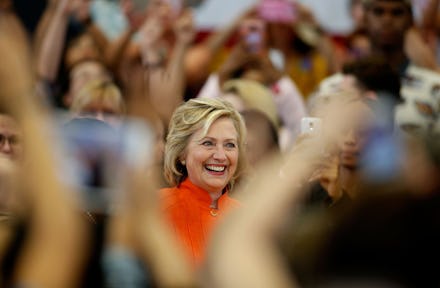New Evidence That Hillary Clinton Is Paying a Price for Her Email Scandal

If you want to be popular, don't run for president. In fact, it's probably better to steer clear of politics altogether, especially on the national stage, which plays to an audience of critics every hour of the day, every day of the month and year. Hillary Clinton has been in the public eye for decades. Bad reviews are part of the gig, but a new batch out Wednesday morning are her worst in 14 years.
According to the latest CNN/ORC poll, 53% of Americans have an unfavorable view of the former secretary of state and frontrunner in the narrowing race for the Democratic presidential nomination. Only 44% said they had a favorable opinion. The breakdown is the same as it was in March 2001, right after Clinton became New York's junior senator.
Why? If you poke around enough, pundits and partisans will offer up a variety of reasons for her summer downturn. Some chalk it up to media bias or inevitable infighting among Clinton's "allies outside the campaign." Others simply deny it exists.
But the swoon is real and the most compelling explanation lies right inside the poll, in response to a question asking whether Clinton "did or did not do anything wrong" when she chose, upon taking over the State Department in 2009, to conduct public business using a private email address run through a secret server installed at her home in New York.
In this latest survey, 54% of Americans said they believed Clinton did, in fact, do "something wrong," an increase of five points since the story broke in March. Those who think she did not do anything inappropriate was down eight points, to 39%. The percentage of those with "no opinion" grew from 2% to 5%.
Savvy political observers and scolds have been quick to dismiss the mess as the creation of a thirsty summer media. This is a normal part of the process, and common among all stripes of political strategists when bad math begins to feed a potentially damaging narrative. See this tweet from Mike Murphy, the head of former Florida Gov. Jeb Bush's super PAC. Bush trails Donald Trump by double digits in most national polls, including a CNN/ORC survey of Republicans released Tuesday.
For Clinton, though, these latest numbers represent the strongest evidence yet that, contrary to Beltway wisdom, the email scandal has crossed over from the realm of idle chatter and intrigue into a legitimate campaign issue, neither too obtuse in nature nor prematurely timed to be shrugged off by the candidate.
Not convinced: Clinton herself has shown no public signs of concern. When asked Tuesday to play pundit and speculate on whether the questions will follow her into 2016, she dismissed the topic as a media creation.
"Nobody talked to me about it — other than you guys," she told a reporter. This is probably true. The supporters circling the wagons for Clinton at her campaign events are not going to ask tough, detailed questions about a growing scandal that is mostly inscrutable. Perhaps this explains her alternately pedantic and cavalier attitude during the initial question and answer session with the press:
The counterargument: Even if the email scandal is gaining more traction than the experts initially expected, the core caveats are still worth considering. It is, indeed, only August 2015. Interest is high, but millions of voters remain on the sidelines. Given that, the current trends and data should be mostly meaningless when the rubber hits the road early next year.
Here is some good evidence in that vein: According to the CNN/ORC poll, a quarter of registered voters have never heard of Sen. Bernie Sanders (I-Vt.). If you follow politics closely, that number might seem weirdly low. Sanders is inescapable on social media, especially for those moving in liberal circles. And yet, a quarter of Americans have no clue who he is. Gauging the intensity with which the people around you approach and react to the news of the day can be a tricky task.
But this is, in the jargon of political reporting, simply the "meta-narrative." It's how we talk about what we're talking about. It is important because most people get a large chunk of their news from friends. Be it a chat at the bar or on social media, the voters paying attention in August 2015 are going to be the ones their friends and colleagues turn to for sources and information as the actual voting nears. If Clinton cannot successfully dismiss or shrug off the questions soon and in a meaningful way, the doubt is bound to linger.
How much will it cost her at the polls? Herein lies another paradox. Recent history suggests Clinton's troubles now won't matter much in the long run. The country is so politically divided that any nominee, Democrat or Republican, is likely to win at least 47% of the vote on Election Day. Because the Clinton brand is so well-established and battle-worn, it's hard to imagine millions of true believers deeming this latest email controversy a scandal too far and formally switching their allegiances. What they might do, however, is nothing at all, and a lack of enthusiasm for a candidate can severely hamper get-out-the-vote efforts on his or her behalf. Bummer news cycles are a drain on our civic vitality.
Negative campaigning, for instance, is a useful tool for wounding an opponent, but it also drives down voter turnout. Clinton's less dedicated supporters might not go and cast their ballots for Sanders, and they certainly aren't about to defect, in a general election, to Trump or Bush. No, for Clinton, the worry now is that they might not do anything at all.